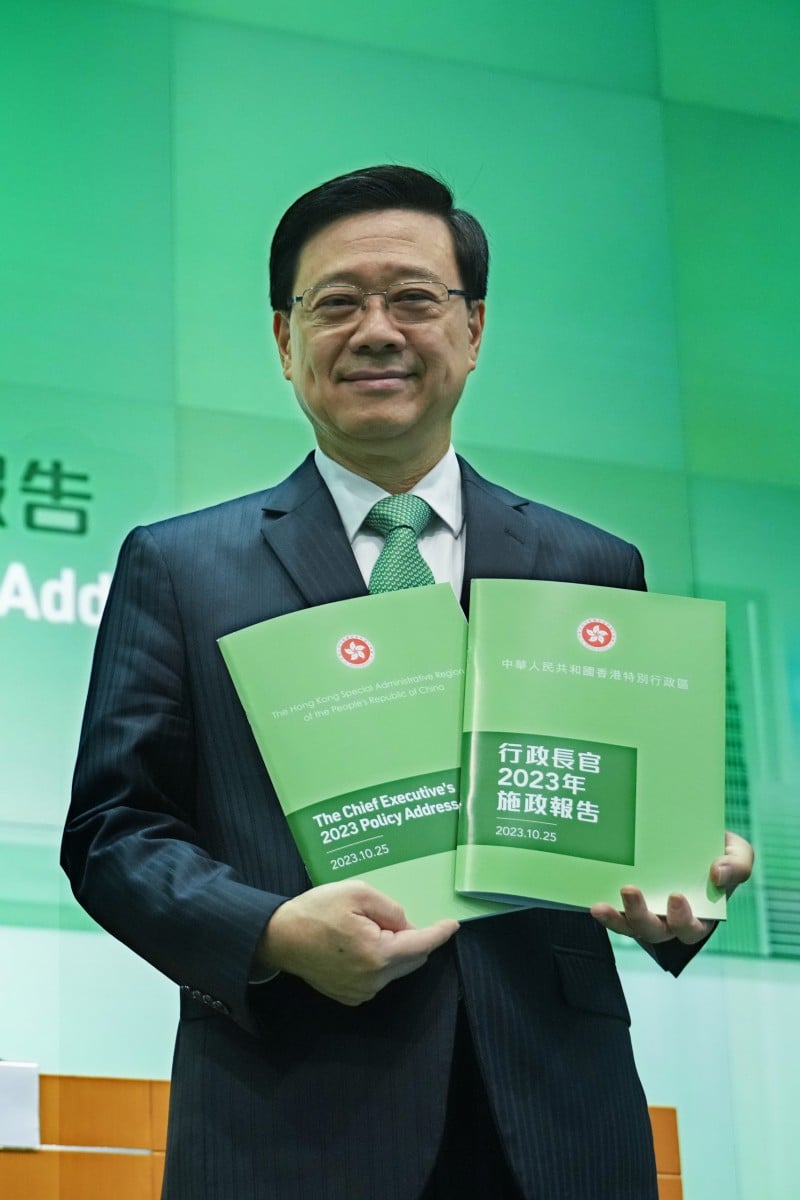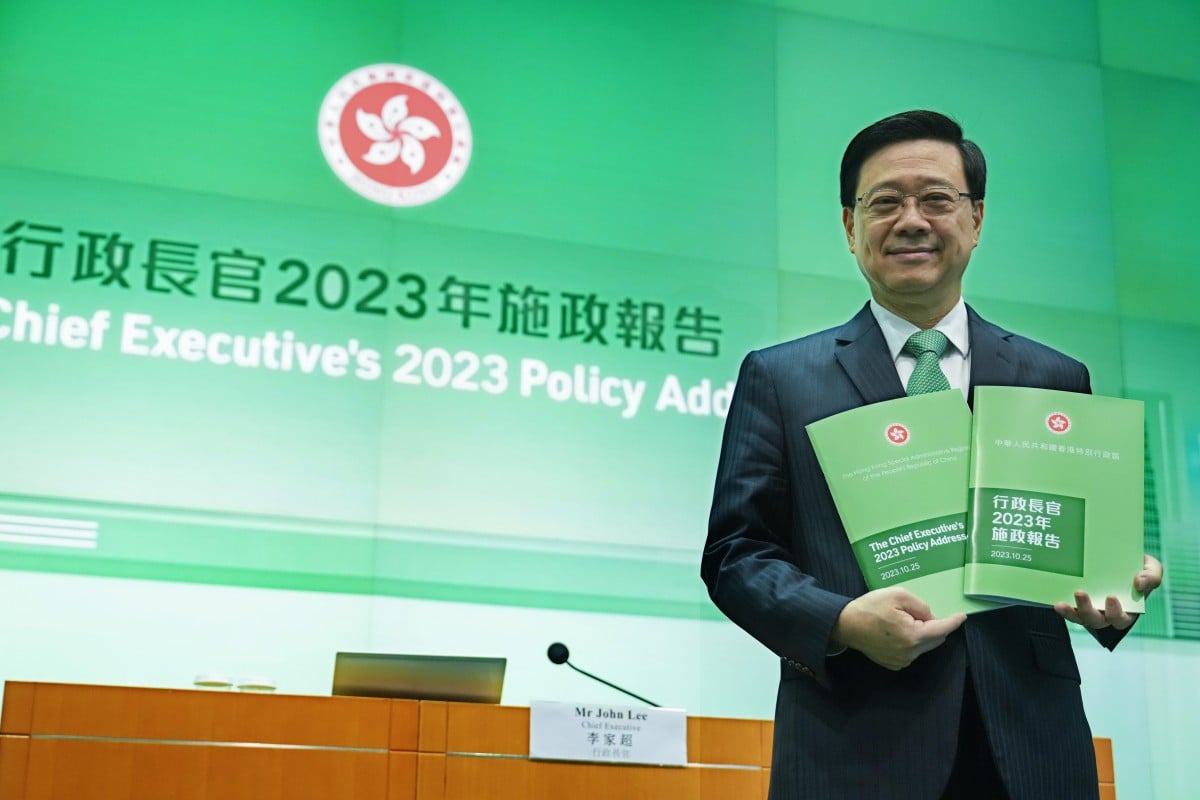
- City leader unveiled plans for national education, mental health resources and increasing youth participation in public affairs
- Students say proposals could encourage connection to heritage, but plans for student well-being need to be inclusive and accessible for all
 Chief Executive John Lee Ka-chiu gave his second policy address at the Central Government Office in Admiralty on Wednesday. Photo: Sam Tsang
Chief Executive John Lee Ka-chiu gave his second policy address at the Central Government Office in Admiralty on Wednesday. Photo: Sam TsangHong Kong students have responded positively to the second policy address from city leader John Lee Ka-chiu on Wednesday morning regarding measures focused on youth development.
The blueprint, presented at the Legislative Council, highlighted Lee’s vision for the future of Hong Kong. It also incorporated the principles of the “four musts, four hopes” and youth development initiatives outlined by Chinese President Xi Jinping in 2022.
“Our policy objectives are to make Hong Kong a better place for all – for people to enjoy a better living environment, students to receive a quality education, young people to fully realise their potential, and the elderly to be well taken care of,” said the chief executive.
National education programme to be expanded to cover more than 900 Hong Kong schools
Youth development initiatives unveiled in the new policy address include patriotic education, the introduction of a mental health literacy resource for kids, the establishment of a new university of applied sciences, support for STEAM education, and increased youth participation in public affairs.
Lee also announced the introduction of a new humanities curriculum framework for primary schools, along with interschool national education activities to enhance national affairs education. Plans are also being made to organise a Chinese Culture Festival next year and open two new museums related to Chinese culture.
Clarisse Poon, a St Paul’s Co-educational College student, believes that it’s a “good initiative” to start national education at an early age but that it should not be a “hard sell” and should be relevant to daily life.
“Currently, there is limited national education at school, only a couple of lessons in the common knowledge course in primary school,” said the 13-year-old student. “[Being able to identify] with the nation will also encourage some to study or even work in mainland China in the future, widening their study and career opportunities.”
Sophia Ling, an 11-year-old student at German Swiss International School, agreed and believed such activities could broaden students’ perspectives and foster a sense of civic responsibility.
“I think it’s a great idea to enhance national affairs education through the events mentioned, as books and lectures would be extremely boring ... These initiatives can help us develop a stronger connection to our cultural heritage, history, and values and can be valuable to our overall education,” said the international school student.
All about Hong Kong’s new subject focused on national security for junior secondary school students
Apart from patriotic education, the chief executive also addressed the issue of improving student well-being by announcing the launch of the “Mental Health Literacy” resource kit for upper primary and junior secondary schoolchildren.
Charis Chan, a Malvern College Hong Kong student, sees this as a “useful” tool.
“[It could] bring many more positive impacts, such as brightening up the overall school atmosphere, having students share their feelings more openly with others, and knowing what to do when faced with negative emotions for a long time,” said the 14-year-old, suggesting that regular student check-ins with social workers would also protect children’s well-being.
Hongkongers’ happiness at decade low, survey finds, as concern group cites Covid ‘post-trauma’
However, Clarisse believes that mental health literacy alone may not effectively address the issue. “It is more important to address the root causes of mental illness among students – the pressure to study and stress in social or family relationships,” she said. “Seminars by qualified social workers or psychologists to help students cope with such stress would be more helpful than just a resource kit.”
In addition to school learning, the policy address highlighted the Youth Link project launched by the Home and Youth Affairs department last month. The project aims to encourage youth participation in public affairs and help them develop their diverse talents through activities like a creativity bazaar and small-scale performance spaces.
With target participants aged 12 to 39, it has recruited nearly 5,000 young people with experience in other youth development programmes.
Students believe the initiative could benefit young people and drive positive change in the community.
“It inspires youngsters to improve Hong Kong society,” Charis said, adding that it would give students the chance to run events and introduce their ideas for improving the city.
Resonating with Charis, Sophia said: “I think the initiative can empower young people and encourage active involvement in shaping their community … but it’s important to ensure that the initiative is inclusive, accessible to all youth, and provides ongoing support and resources to nurture their talents and interests.”
